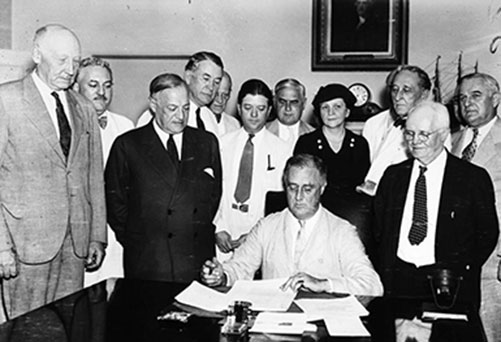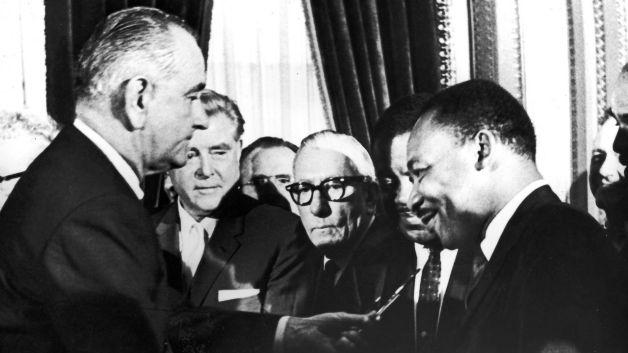
President Franklin D. Roosevelt signs the Social Security Act.
As this presidential election season continues its torturous path, my attention is focused more on the Democratic contest than the ridiculousness of what is consuming Republicans. For on the Democratic side, there is a very real and substantive debate about not only the direction of that party but the limits of African-American aspirations in this country.
The criticism leveled against Bernie Sanders by Hillary Clinton supporters, including many African-Americans, is that the Vermont senator is a hopeless dreamer. The critique of Sanders, including in legacy or ‘mainstream’ media, is that the Democratic-Socialist offers rhetoric but no real plan. He is accused of leading his supporters astray; a charge that is based on either the belief that Sanders possesses some magical pixie dust that can sway voters or that his supporters are mindless drones. What is lost in popular analyses of the Democratic contest is that there is a record from which to draw conclusions – the voting behavior and thematic advocacy of Senator Sanders and that of Hillary Clinton during her tenure in the Senate, the State Department and her policy incursions as First Lady. The charge that Sanders must have all the answers is duplicitous, as was the thinly disguised attack on the candidate by the New York Daily News after he sat with its editorial board. If policy specificity is the gold standard, then Hillary Clinton failed miserably with her disastrous rollout of a health care proposal during her husband’s presidency.
Let’s get to the real contradiction of Black electoral behavior. On the one hand we get misty eyed when we romanticize about the civil rights movement and when we speak about Dr. King’s misconstrued “Dream” he shared with us on a hot August day in the nation’s capital. We ‘dream speak’ but then we behave in a manner that exposes our fears. We neither invest in the true work of dreaming; the mechanics of radical change or want to confront the structural leviathans that don’t allow us the peace that King desired for us all. We have surrendered to a marginalization of our aspirations that embraces only what we believe is possible and tags as impossible the type of recalibration of power that is truly necessary if Blacks are ever to be full citizens in this nation.
After decades of being told that we must be pragmatic, that choosing the lesser of two supposed evils is a responsible way to engage the political system, and listening to the right/center-right Republican and Democratic attack on activist government, we have now downward adjusted our expectations for change. This belief that the impossible is not possible contradicts a history of supposedly impossible accomplishments. We have a social insurance program today although most thought the idea of Social Security was not plausible. Today college students can get federal financial support through a Pell Grant (originally the Basic Educational Opportunity Grant or “BEOG”) when at one time affording a college education was not deemed the responsibility of the federal government. A disjointed and fragmented course of interstate travel was alleviated by a federal highway system. At a time when our nation’s rocket technology was suspect, a sitting President had the audacity to proclaim we would not only send a man into space but we would land a man on the moon within a ten-year period; and where one President failed, the nation’s first African-American President pushed, cajoled and finessed a national health care program into existence in a hostile political environment. Of course, the very idea of electing a Black person to the presidency was considered beyond impossible. We’ve always achieved the impossible when the political will was present or when segments of our population made demands upon government and worked tirelessly to bring the impossible into existence.

President Johnson greets Dr. Martin Luther King, Jr. after signing the Voting Rights Act of 1965.
We have not only stopped dreaming, we have stopped hoping. It is a moral-less surrender that betrays the sacrifices of so many who envisioned true freedom and were willing to die knowing they would never reach that station in their travels. In his last book “Where Do We Go from Here: Chaos or Community?” Dr. King opined “It is precisely the collision of immoral power with powerless morality which constitutes the major crisis of our times.” If written today, the subheading of King’s book might be “Chaos or Confusion” as a more accurate reflection of our political condition.
The irony is that King’s “dream” was inclusive of the poor, the working class (those striking Memphis sanitation workers) and people of color; with African-Americans in the United States the initial focus of his claim for jobs and freedom. What has been lost in this presidential season is that Dr. King was attempting to reconcile the legitimate needs and demands of poor whites and the historical suffering and civil ostracism of African-Americans. The Southern Christian Leadership Conference’s (SCLC) “Poor Peoples Campaign” was a seminal moment in social reconstruction; an opportunity to align the class and racial dimensions of America’s suffering classes. King’s message was directed as much to the concerns of people who look like today’s supporters of Donald Trump as it was to many people who look like those currently aligned with Bernie Sanders.
One thing is also certain, King was not supportive the politics of what we know today as Clintonism. Don’t believe me? Read any one of the late civil rights leader’s books and it becomes clear that Dr. King was opposed to the military-industrial complex, the abuse of the working class, materialism and the obsession with hoarding wealth, the treatment of the poor and the structural racism that continues to deny African-Americans the fullness of their American citizenship.
There is nothing in the message of Hillary Clinton, or the politics of Bill Clinton, that speak to the issues that consumed Dr. King’s life work or gives me any “hope” that a Hillary Clinton administration will be fundamentally any different in policy profile than that of her husband. Her message is that of the now defunct Democratic Leadership Council (DLC), an amorphous string of policy Pablum that caters to the nation’s moneyed elites, uses the middle class as a shield to deflect a critique of the candidate’s corporatist religion, disparages the poor for not being responsible and denies the damage done by systemic racism, and preaches a foreign policy muscularity that swells the military-industrial complex to the point where armed conflict is unavoidable given our investment in the machinery of war.
President Barack Obama signs the landmark Affordable Care Act.
The rejection of Bernie Sanders by many older (over 40) Black voters is perplexing. His message comes right out of the King playbook; striking the same themes that the civil rights leader touched upon from Montgomery to Memphis. Yet, Sanders is criticized for offering promises he can’t keep or not providing the granularity of policy proposals that tend to dissolve into dust whenever a president takes office, and unrealistic in his belief that he can get things accomplished with a hostile Republican Congress. What is lost is that securing voting rights was a claim upon this country, promise by civil rights activists and then two Presidents that few thought could be kept. It was an effort that was waged before a hostile Congress; mainly conservative southern Democrats, or ‘Dixiecrats.’ No one had all the answers how a federal voting rights statute would work; there were certainly pieces but the idea that the intricacies of federal intervention was neatly packaged in a candidate’s platform is false. It took five years of blood, sweat, tears and disappointment, from 1960 until 1965 for the Voting Rights Act to pass in Congress and signed by President Lyndon Johnson. Most importantly, it took the hope of dreaming into existence something that was considered impossible given the climate of the time.
Why do we see a generational split in the voting behavior of Black Democrats this year? The under-40 voters are not naïve or unrealistic about the difficulty of advancing a truly transformative agenda. They are simply unaccepting of excuses after being confronted with racial profiling, incarceration, debt from college loans, persistent racism and sexism, and a lottery of a job market. Whom is responsible for this defiance? The civil rights generation. We encouraged the millennials to dream. We convinced them that the fight for civil rights was just and incomplete. We showered them with stories of resistance. We held up as icons the warriors of the movement. We led them to believe that they were equal. Now, when they step forward to lay claim to that inheritance, we tell them that they have unrealistic expectations for change.
What this presidential campaign has revealed is how many African-Americans have simply surrendered. It is somewhat understandable given conditions we still face in this nation, but truly unacceptable given our emotion-laden rhetoric around the life of Dr. King. If we cannot accept the sacrifices that this struggle entails or the reality that many of us will not see that ‘better day,’ we should collectively lay “The Dream” to rest. We will never reach the mountaintop that Dr. King prophesied in his last speech if we allow ourselves to be stuck in the valley of fear and concession; surrendering to a pragmatism that will forever put us in the position of accepting less than when we should be demanding our full share.
Walter Fields is Executive Editor of NorthStarNews.com.
















